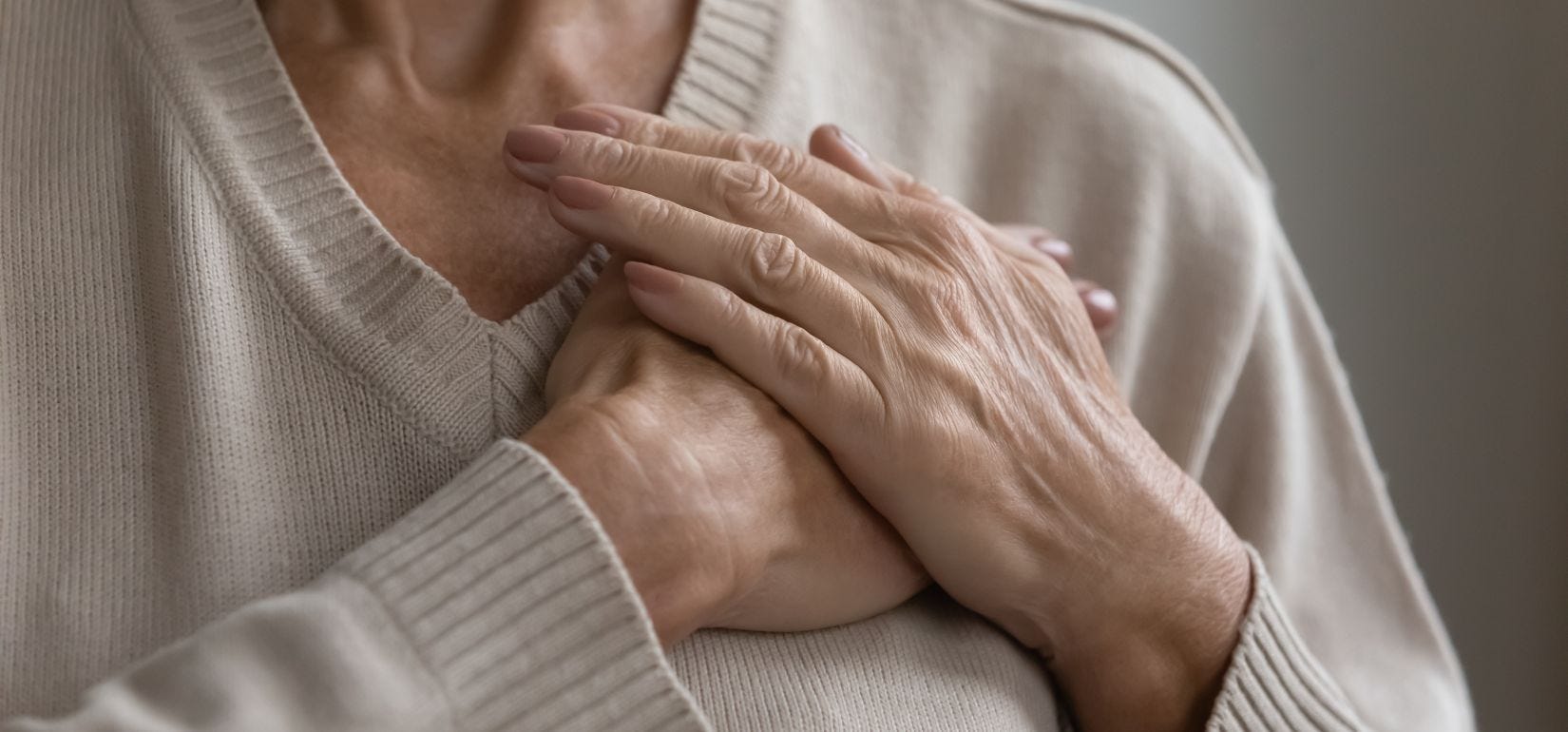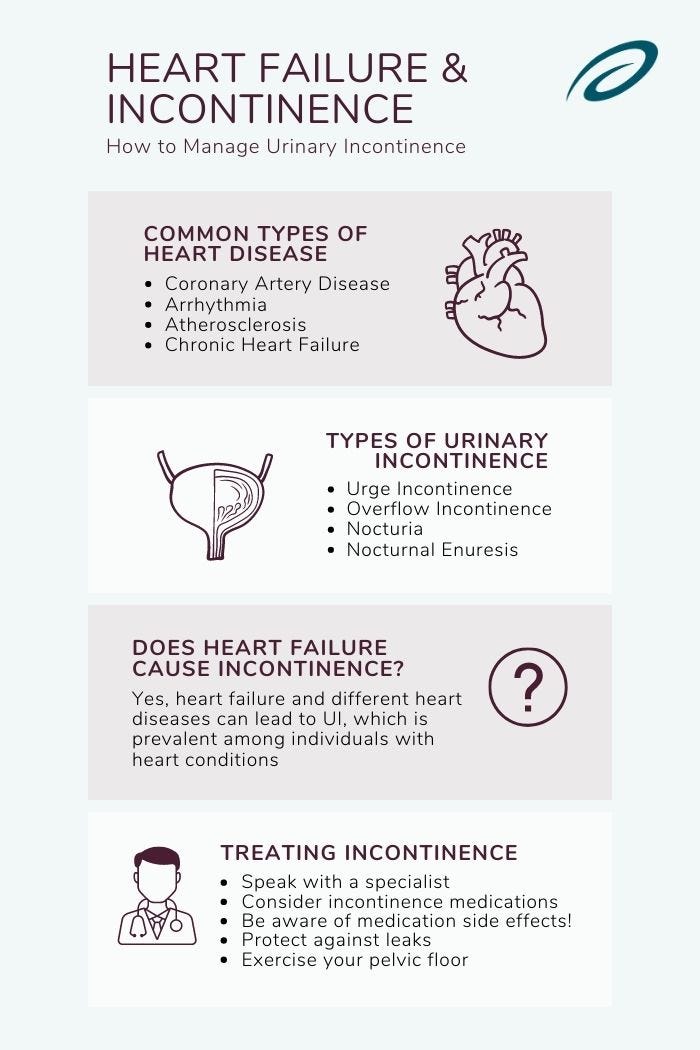Heart disease is a significant concern for many individuals in the United States. In 2018 alone, over 30 million adults were diagnosed with the condition.
Because it’s such a prevalent medical concern, many of us are aware of its signs and symptoms, but one you may not be aware of is urinary incontinence or the loss of bladder control.
Bladder problems can be challenging to manage and lower your quality of life if you don’t find proper treatment. In this article, we’ll provide suggestions on ways to manage these symptoms so you can live confidently. We’ll also give you tips on keeping your heart healthy long-term!
IN THIS ARTICLE:
What Are the Different Types of Heart Disease?
How Does Heart Failure Affect Your Bladder?
How Can You Get Free Incontinence Products for Urinary Incontinence?
Can Heart Failure Cause Daytime Urinary Incontinence?
Why Does Heart Failure Make You Pee at Night?
What Are the Different Types of Heart Disease?
“Heart disease” is an umbrella term for multiple types of cardiovascular medical conditions. These may include:
Check Your Eligibility
2 Easy Steps
From catheters to pediatric and adult incontinence supplies, discover the continence care essentials covered by your insurance.
- Coronary Artery Disease (CAD): The most common form of heart disease, CAD narrows or blocks your heart’s blood vessels, affecting blood flow to the heart. This can lead to heart attack or angina.
- Arrhythmia: Irregular heartbeats— either too fast or too slow— due to problems with the electrical signals in your heart.
- Atherosclerosis: Decreased blood flow to the heart due to plaque buildup on heart arteries from cholesterol or fats.
- Chronic Heart Failure: Also called congestive heart failure, this occurs when your heart is unable to pump blood to the body correctly due to CAD, high blood pressure, or heart attack.
Does Heart Failure Affect Your Bladder?
Heart failure is a serious condition that can cause different symptoms, such as:
- Fatigue
- Shortness of breath.
- Fluid retention.
Another lesser-known symptom caused by heart failure and other heart conditions is urinary incontinence (UI). UI is the loss of bladder control which can lead to a handful of symptoms, depending on which type of UI you develop. A common symptom of UI is the unintentional loss of urine.
Can Heart Failure Cause Daytime Urinary Incontinence?
Yes, heart failure and different heart diseases can cause urinary leakage during the day, which is prevalent among individuals with said conditions. According to the International Neurology Journal, up to 50% of people with heart conditions experience UI. The two main types of daytime UI that you may experience with these conditions are:
- Urge Incontinence. Urge incontinence, also called overactive bladder (OAB), is commonly associated with heart conditions. Urge incontinence occurs when your bladder muscles contract more frequently than usual, causing a sudden and intense urge to urinate, sometimes leading to leakage. OAB symptoms include using the bathroom more frequently than usual. If you have heart disease, you may experience urge incontinence / OAB because it can increase urine production.
- Overflow Incontinence. Overflow incontinence is another type of UI you may experience with heart failure. The main symptom of overflow incontinence is the inability to empty your bladder completely, which leads to small amounts of urinary leakage throughout the day. Overflow incontinence may occur if you have heart failure due to urinary blockages or nerve damage.
Heart condition medications, such as diuretics prescribed to you, may also cause UI.
Why Does Heart Failure Make You Pee at Night?
Other types of UI you may manage with heart failure or heart conditions can occur during the night. These include:
- Nocturia: Nocturia is “common, severe, and closely associated” with heart failure. The main symptom of nocturia is waking up more than 2 times during the night to empty your bladder. One reason for nocturia in heart failure patients is secondary to fluid retention during the day and elevation of feet at night. This causes the fluid retained during the day to re-circulate back into your body at night and produces more urine overnight. However, more research is needed to determine why nocturia occurs in heart failure patients.
- Nocturnal Enuresis (NE). Also known as bedwetting, NE can occur in both children and older adults with heart arrhythmia. The main symptom of NE is leaking urine while sleeping.


The connection between NE and heart failure is complicated. One reason this may occur is because heart failure makes it difficult for your body to void excess fluids and because lying down increases kidney function. Therefore, when you lie down to sleep, your body may produce more urine, leading to a full bladder during sleep. Another reason may be due to nocturia; those with nocturia may experience severe fatigue, leading to worsened heart disease and more NE symptoms.
Medications, like diuretics, that may be prescribed if you have heart conditions, may also cause nighttime UI. Talk with your healthcare provider to discuss optimizing when you take your medications that may allow for decreased urine output overnight.
What Are the Signs of Heart Failure?
Signs of heart failure or heart disease may include:
- Chest pain.
- Dizziness
- Fatigue or tiredness.
- Shortness of breath.
- Swollen limbs (feet, ankles, etc.).


Tips for a Healthy Heart
Keeping your heart healthy may seem like an overwhelming task, but you can make simple lifestyle changes to keep your heart happy!
- Eat a healthy diet. Include whole grains, fruits, vegetables, and protein in your diet.
- Include physical activity in your routine and maintain a healthy weight. You can walk, run, bike, swim, do yoga, or any other movement that makes you happy!
- Stop smoking and be aware of secondhand smoke.
- Watch out for high cholesterol and blood sugar levels.
- Manage your blood pressure and stress levels.
- Avoid alcohol.
Managing Urinary Incontinence & Heart Disease
Urinary symptoms can sometimes feel embarrassing and cause stress. However, with proper treatment, caring for UI is easy! Use these tips to manage your symptoms.
- Speak with a specialist. If you’re experiencing UI, especially if you’re a heart failure patient, you should seek help from healthcare professionals specializing in urology or cardiology. Your cardiologist or urologist should be able to guide you on managing heart conditions and UI symptoms.
- Consider incontinence medications. You can discuss the option of being prescribed anticholinergics and beta-blockers to lessen your UI symptoms. These medications relax your bladder muscles and slow urine production.
- But be aware of medication side effects! Some heart disease medications can cause symptoms of UI. This is especially true for diuretics that increase the rate at which excess fluids exit your body.
- Exercise your pelvic floor. On top of exercising regularly to keep your heart healthy, you should exercise your pelvic floor muscles. Kegels and other exercises have been proven to strengthen your pelvic floor muscles and lessen incontinence symptoms over time. Remember: both men and women can do pelvic floor exercises!


- Protect against leaks! Continence issues don’t have to hold you back. Absorbent incontinence products, such as bladder control pads, adult protective underwear, and adult briefs, keep you dry throughout the day or night, no matter the activity you’re engaging in. Plus, they protect your skin from infection and irritation, leaving you feeling comfortable and confident. You may be able to receive free incontinence products like the ones mentioned and more with Aeroflow Urology. See if you qualify for medical-grade products 100% covered by your insurance today.
While the added condition of incontinence may feel like a burden to deal with on top of a heart condition, it’s essential to recognize that millions of Americans have the condition and easily manage symptoms daily!
References
Centers for Disease Control and Prevention. (2019, May 14). Heart Health Information: About Heart Disease. Centers for Disease Control and Prevention. https://www.cdc.gov/heartdisease/about.htm
NHS Inform. (2018). Common heart conditions. Nhsinform.scot. https://www.nhsinform.scot/illnesses-and-conditions/heart-and-blood-vessels/conditions/common-heart-conditions
https://www.cancer.gov/publications/dictionaries/cancer-terms/def/chronic-heart-failure. (2011, February 2). Www.cancer.gov. https://www.cancer.gov/publications/dictionaries/cancer-terms/def/chronic-heart-failure
Palmer, M. H., Hardin, S. R., Behrend, C., Collins, S. K.-R. ., Madigan, C. K., & Carlson, J. R. (2009). Urinary Incontinence and Overactive Bladder in Patients With Heart Failure. Journal of Urology, 182(1), 196–202. https://doi.org/10.1016/j.juro.2009.02.115
Son, Y.-J., & Kwon, B. E. (2018). Overactive Bladder is a Distress Symptom in Heart Failure. International Neurourology Journal, 22(2), 77–82. https://doi.org/10.5213/inj.1836120.060
Chronic Heart Failure and Incontinence. (n.d.). Www.incontinencesupermarket.co.uk. Retrieved July 12, 2023, from https://www.incontinencesupermarket.co.uk/blog/chronic-heart-failure-incontinence#:~:text=If%20you%20have%20chronic%20heart
Redeker, N. S., Adams, L., Berkowitz, R., Blank, L., Freudenberger, R., Gilbert, M., Walsleben, J., Zucker, M. J., & Rapoport, D. (2012). Nocturia, Sleep and Daytime Function in Stable Heart Failure. Journal of Cardiac Failure, 18(7), 569–575. https://doi.org/10.1016/j.cardfail.2012.05.002
admin. (2015, February 17). The Link Between Nighttime Urination and Heart Health. Incontinence Institute. https://myconfidentlife.com/blog/the-link-between-nighttime-urination-and-heart-health
Keep Your Heart Healthy - MyHealthfinder | health.gov. (2022, July 29). Health.gov. https://health.gov/myhealthfinder/health-conditions/heart-health/keep-your-heart-healthy
Disclaimer
Information provided on the Aeroflow Urology blog is not intended as a substitute to medical advice or care from a healthcare professional. Aeroflow recommends consulting your healthcare provider if you are experiencing medical issues relating to incontinence.














